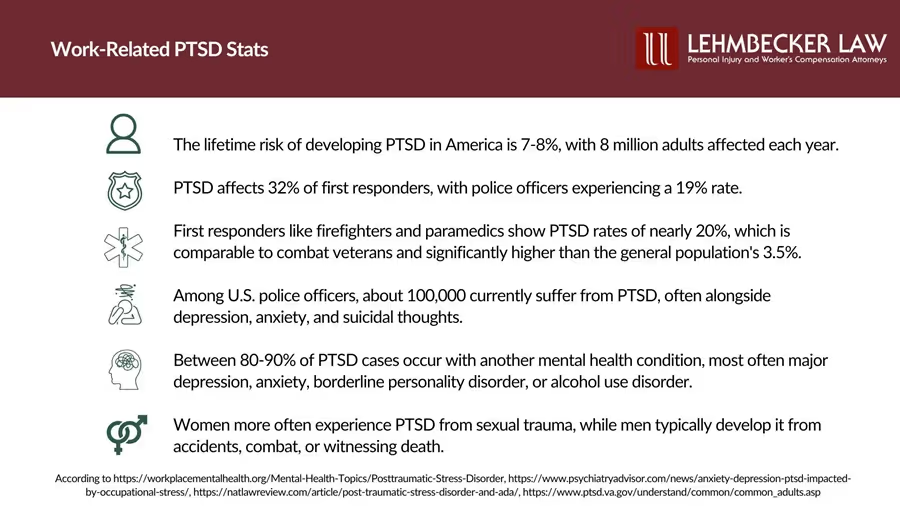There is no fee unless we win!
EN

- EN
- ES


Post-traumatic stress disorder (PTSD) can be a valid reason for filing a workers' compensation claim in Washington State. The specific type of claim depends on the worker's job and the nature of the traumatic event.
If PTSD results from a single event, workers in all occupations can potentially file a successful workers' compensation claim. For trauma caused by the accumulation of multiple incidents, only first responders (such as police officers, firefighters, and EMTs) are typically eligible for workers' compensation in Washington.

Work-related post-traumatic stress disorder is a serious mental health condition that can develop after exposure to traumatic events on the job. Unlike acute stress disorder, which typically resolves within about a month, PTSD symptoms can persist for years, significantly impacting an individual’s job performance and daily life.
According to the Diagnostic and Statistical Manual of Mental Disorders, the symptoms of PTSD include:
Common workplace scenarios that may lead to the development of PTSD include witnessing a death, suffering a serious accident, or being subjected to sexual violence. First responders frequently encounter traumatic incidents that can trigger PTSD, though any worker who experiences or witnesses extraordinary or disturbing things at work may develop this condition.
Under Washington State's workers' compensation system, most workers can only claim benefits for mental health conditions if they stem from a single traumatic incident. Those caused by ongoing stress are specifically excluded from occupational disease coverage.
However, this changed for first responders in 2019. While other workers remain under the original restrictions, first responders can now successfully claim workers' compensation benefits for PTSD that develops as a result of accumulated psychological trauma over time, meaning such trauma is now seen as an occupational disease.
Previously, claims based on the cumulative effects of multiple traumatic experiences weren't accepted, even if those experiences collectively led to severe mental health concerns. This older standard continues to apply to all Washington State workers except those classified as first responders.
Washington’s approach to PTSD coverage through workers' compensation depends on your occupation. Here are how the rules apply to various professions:
Washington State recognizes the unique challenges first responders face through limited statutory exceptions. Under recent legislation, first responders benefit from a "rebuttable presumption" that PTSD is work-related.
This principle extends to:
For these professionals, PTSD is presumed to be an occupational disease unless the employer can prove otherwise. This significantly eases the burden of proof compared to other workers filing PTSD claims.
For other jobs in Washington State, PTSD caused by a single traumatic work event can be considered a work injury (RCW 51.08.100 and WAC 296-14-300).
Claiming workers' compensation benefits for PTSD can be challenging. The state has traditionally maintained strict criteria for mental health conditions, requiring that workers prove that their PTSD was caused by extraordinary stress beyond their usual work experience.
To receive workers' compensation benefits for PTSD, workers must generally demonstrate the following:
Establishing these factors often requires the aid of both medical and legal professionals.

Let’s take a closer look at what you need to do to file a PTSD claim, get it approved, and handle any problems that arise along the way.
The first thing you’ll need to do is tell your employer what happened and see a doctor.
If your PTSD came from one specific incident, you’ll have one year to file your claim. First responders dealing with trauma built up over time have two years from the time their doctor connects their PTSD to a work-related event.
It’s a good idea to take action sooner rather than later — the longer you wait, the harder it will get to prove your case.
Your medical records can make or break your claim. You'll need solid documentation from a mental health professional that spells out your PTSD symptoms and connects them to your job.
If you’re a first responder, your medical records should show how multiple traumatic events at work culminated in your condition. Be honest and direct with your care team about how your symptoms affect your ability to work.
If your claim has been denied, you’ll have 60 days to appeal to the Board of Industrial Insurance Appeals. PTSD claims often get dismissed due to paperwork issues or questions about whether the condition is really work-related. The key to avoiding such a situation is to respond quickly and have the right documentation to back up your case.
Workers' comp in Washington offers several types of assistance for those dealing with PTSD. Here's what you might be able to get:
Your workers’ comp benefits may cover visits to psychiatrists and therapists, medications, and other mental health care your doctor says you need. Keep in mind that your treatment plan might change as you recover, and that's okay — workers' comp should keep covering what your doctor recommends.

If your PTSD keeps you home, you can potentially get payment to help replace your lost wages. This is true whether you can't work at all or just need to cut back your hours. The amount you stand to recover depends on how much you were making before.
Sometimes, struggling with PTSD means you can't go back to your old job. In that case, you might qualify for job retraining or help finding work that accommodates any limitations you now have. Washington State Department of Labor & Industries (L&I) officials will work with you to determine what kind of job you can handle.
If your PTSD leaves you with permanent limitations, you might qualify for ongoing disability payments. These can be either partial (if you can still work some) or total (if you can't work at all).
PTSD claims can get complicated fast. Working with someone who knows the system can make a big difference.
The rules for PTSD claims are different depending on whether you're a first responder or not. Our workers' comp lawyers can explain what regulations apply to you and make sure you don't miss any important deadlines when filing your claim.
We know precisely what proof you need to win. Our team will work with your doctors, solicit statements from your coworkers, and bring in other experts as needed to back up your claim.
If your case goes to a hearing, we’ll present your evidence, question any witnesses, and argue your case to the judge. We'll also handle any settlement talks to make sure you don't get shortchanged.

Post-traumatic stress disorder is a serious mental injury that can impact your ability to work and live a normal life. Washington State's workers' compensation system covers PTSD for all workers caused by a single traumatic event or series of events at work; for first responders, PTSD is presumed to be work-related, even if it develops over time.
The dedicated workers' compensation attorneys at Lehmbecker Law understand both the legal complexities and the personal challenges you're facing. We're here to ensure that you receive appropriate compensation and support for your work-related trauma.
Don't let confusion about workers' comp laws prevent you from seeking the help you need. Reach out to us to discuss your situation and learn more about how we can assist you with your PTSD workers' compensation claim.

Our attorneys can help you secure the benefits you deserve for work-related PTSD, whether you're a first responder or a worker from another industry. Contact us today to discuss your case.